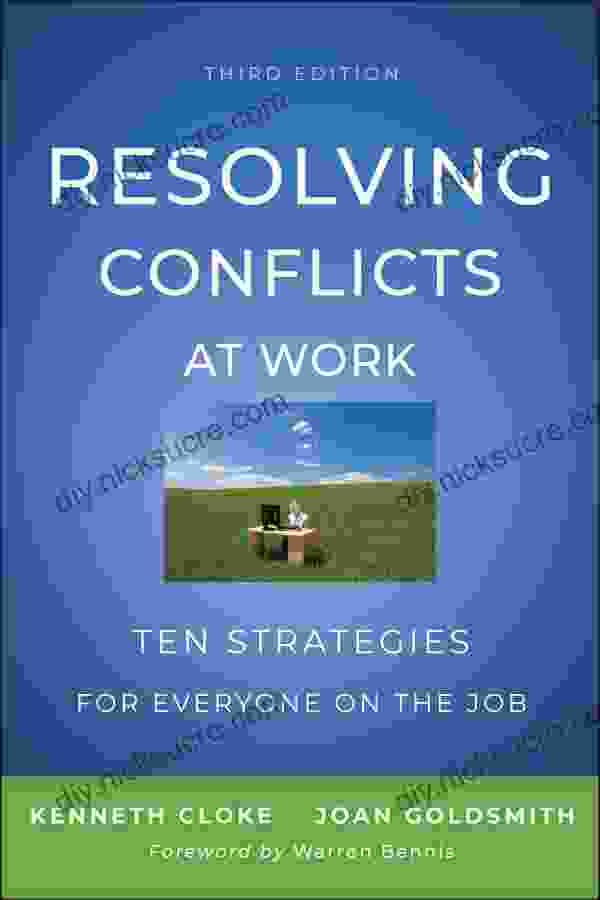Ultimate Guide to Conflict Resolution in the Workplace: Strategies and Techniques to Foster a Harmonious Work Environment

Conflict is an inevitable part of workplace dynamics, stemming from differences in perspectives, goals, and work styles. While conflicts can be disruptive and hinder productivity, they can also present opportunities for growth and improved relationships if handled effectively. This guide provides a comprehensive overview of conflict resolution in the workplace, outlining strategies and techniques to navigate conflicts constructively, foster a positive work environment, and promote teamwork and collaboration.
4.6 out of 5
| Language | : | English |
| File size | : | 1040 KB |
| Text-to-Speech | : | Enabled |
| Screen Reader | : | Supported |
| Enhanced typesetting | : | Enabled |
| Word Wise | : | Enabled |
| Print length | : | 401 pages |
| Lending | : | Enabled |
Understanding Conflict
The first step in conflict resolution is understanding its nature and causes. Conflicts can arise from various sources, including:
- Communication failures: Misunderstandings, misinterpretations, and lack of clear communication can lead to conflicts.
- Differences in values and perspectives: Employees with diverse backgrounds and experiences may have different values and perspectives, leading to clashes in opinions and approaches.
- Competition for resources: Limited resources, such as time, funding, or equipment, can trigger conflicts between individuals or teams.
- Personality clashes: Differences in personality traits, work styles, and communication preferences can contribute to interpersonal conflicts.
- Unresolved grievances: If past conflicts or grievances are not addressed and resolved effectively, they can resurface and escalate into full-blown conflicts.
Strategies for Conflict Resolution
Once the underlying causes of conflict are identified, it's important to adopt effective strategies for resolution. Here are some common strategies:
1. Active Listening and Empathy
Active listening involves paying undivided attention to the other person's perspective, without interrupting or dismissing their views. Show empathy by acknowledging their feelings and understanding their point of view, even if you don't agree with them.
2. Problem-Solving Approach
Focus on identifying the root cause of the conflict and finding mutually acceptable solutions. Instead of dwelling on blame or past grievances, collaborate with the other party to brainstorm and evaluate potential solutions.
3. Mediation
If direct communication proves challenging, consider involving a neutral third party, such as a manager, HR representative, or external mediator, to facilitate the conversation and help find a common ground.
4. Negotiation and Compromise
Negotiation involves finding a mutually acceptable solution that satisfies both parties. Be willing to compromise and find areas where you can agree, while upholding your core interests and values.
5. Team-Building and Conflict Resolution Training
Invest in team-building activities and conflict resolution training programs to improve communication, build trust, and equip employees with the skills to handle conflicts constructively.
Techniques for Effective Conflict Resolution
In addition to adopting the above strategies, consider implementing the following techniques for effective conflict resolution:
1. Use "I" Statements
When expressing your perspective, start with "I" statements to convey your feelings and needs without blaming others. For example, instead of saying "You're always late," try "I feel frustrated when I have to wait for you."
2. Focus on the Present
Avoid dwelling on past conflicts or bringing up unrelated issues. Focus on the current situation and address the specific conflict at hand to prevent escalation.
3. Find Common Ground
Even in the midst of conflict, it's crucial to find areas of agreement or shared interests. Identify common goals or values that can serve as a starting point for finding a solution.
4. Practice Active Listening
Give the other person ample time to express their views without interrupting. Pay attention to both verbal and non-verbal cues to understand their perspective and feelings.
5. Use Positive Body Language
Maintain open and welcoming body language throughout the conversation. Make eye contact, lean forward slightly, and avoid crossing your arms or legs to convey engagement and respect.
Benefits of Conflict Resolution
Effective conflict resolution brings numerous benefits to the workplace, including:
1. Improved Communication and Collaboration
When conflicts are resolved constructively, it paves the way for improved communication and collaboration among team members. Trust and understanding are fostered, allowing for more effective teamwork and problem-solving.
2. Increased Productivity and Efficiency
Unresolved conflicts can hinder productivity and efficiency. By addressing and resolving conflicts effectively, teams can focus on shared goals and objectives, leading to increased productivity and improved outcomes.
3. Reduced Stress and Conflict Escalation
Conflicts can create a stressful work environment. Effective resolution techniques help mitigate stress, prevent conflicts from escalating, and maintain a positive and productive atmosphere.
4. Stronger Relationships and Team Dynamics
When conflicts are handled maturely, they can actually strengthen relationships and improve team dynamics. By working together to find solutions, team members learn to appreciate diverse perspectives and build stronger bonds.
5. Enhanced Job Satisfaction and Morale
A workplace where conflicts are resolved fairly and effectively contributes to job satisfaction and overall morale. Employees feel valued, respected, and more engaged in their work.
Conflict resolution is an essential skill in the workplace, fostering a harmonious and productive work environment. By understanding the nature of conflict, adopting effective strategies, and implementing practical techniques, organizations and individuals can navigate conflicts constructively, promote teamwork and collaboration, and reap the benefits of a positive and fulfilling work culture. Remember, conflicts are not inherently negative; they can be opportunities for growth, improved relationships, and enhanced job satisfaction when handled with maturity and a commitment to finding mutually acceptable solutions. Invest in conflict resolution training, foster open communication, and create a workplace where conflicts are approached as chances for betterment, leading to a harmonious and thriving work environment.
4.6 out of 5
| Language | : | English |
| File size | : | 1040 KB |
| Text-to-Speech | : | Enabled |
| Screen Reader | : | Supported |
| Enhanced typesetting | : | Enabled |
| Word Wise | : | Enabled |
| Print length | : | 401 pages |
| Lending | : | Enabled |
Do you want to contribute by writing guest posts on this blog?
Please contact us and send us a resume of previous articles that you have written.
 Fiction
Fiction Non Fiction
Non Fiction Romance
Romance Mystery
Mystery Thriller
Thriller SciFi
SciFi Fantasy
Fantasy Horror
Horror Biography
Biography Selfhelp
Selfhelp Business
Business History
History Classics
Classics Poetry
Poetry Childrens
Childrens Young Adult
Young Adult Educational
Educational Cooking
Cooking Travel
Travel Lifestyle
Lifestyle Spirituality
Spirituality Health
Health Fitness
Fitness Technology
Technology Science
Science Arts
Arts Crafts
Crafts DIY
DIY Gardening
Gardening Petcare
Petcare Walter Dean Myers
Walter Dean Myers Christiane Kutik
Christiane Kutik Glenn Patron
Glenn Patron N J Enfield
N J Enfield Steve Angers
Steve Angers Upton Sinclair
Upton Sinclair Peter Nichols
Peter Nichols Tim Flanagan
Tim Flanagan Sharie King
Sharie King John Williams
John Williams Jamal Moustafaev
Jamal Moustafaev Sadie Robertson Huff
Sadie Robertson Huff Todd Gitlin
Todd Gitlin David Deutsch
David Deutsch Jonathan Eig
Jonathan Eig Shelly Mazzanoble
Shelly Mazzanoble Manoush Zomorodi
Manoush Zomorodi Ray Bradbury
Ray Bradbury Cath Smith
Cath Smith Chris I Naylor
Chris I Naylor Lisa Pease
Lisa Pease A J Mackenzie
A J Mackenzie Dane Huckelbridge
Dane Huckelbridge Jane Austen
Jane Austen Linh Phung
Linh Phung Peter Shelton
Peter Shelton Georgia Varozza
Georgia Varozza Abigail Burd Lcsw Pmh C
Abigail Burd Lcsw Pmh C Joseph Mctaggart
Joseph Mctaggart Jonalu Johnstone
Jonalu Johnstone Andreas Quast
Andreas Quast Ken Dryden
Ken Dryden David Remnick
David Remnick William Bauer
William Bauer Carrie Harper
Carrie Harper Jean Philippe Dionne
Jean Philippe Dionne Kerri Hummingbird Sami
Kerri Hummingbird Sami Michael D Coogan
Michael D Coogan Roy Richard Grinker
Roy Richard Grinker Scott A Ostrow
Scott A Ostrow Ryan Gray
Ryan Gray Lisa Murphy
Lisa Murphy Patrick Meechan
Patrick Meechan Natalie Pompilio
Natalie Pompilio Din Daniels
Din Daniels Lucy Christopher
Lucy Christopher The R A
The R A Val Mcdermid
Val Mcdermid Lauren Oliver
Lauren Oliver Tony Wright
Tony Wright Linda Tuhiwai Smith
Linda Tuhiwai Smith Sonya Chappell
Sonya Chappell Philip Yarrow
Philip Yarrow Eric Sevareid
Eric Sevareid Charles Butler
Charles Butler Gabrielle Coleman
Gabrielle Coleman Saxton Pope
Saxton Pope Heather Anderson
Heather Anderson E S Wynn
E S Wynn Dame Darcy
Dame Darcy Josh Skeen
Josh Skeen Lilith Mclelland
Lilith Mclelland Roxanne Martin
Roxanne Martin Corina Morariu
Corina Morariu Eva Mauer
Eva Mauer Charles Edward Chapel
Charles Edward Chapel Lou Zambello
Lou Zambello Marc S Sabatine
Marc S Sabatine Aaron Kleinmeyer
Aaron Kleinmeyer Brian Clegg
Brian Clegg Stan Skinner
Stan Skinner A K Davidson
A K Davidson Chelsea Crockett
Chelsea Crockett Jim Allen
Jim Allen Rafe Esquith
Rafe Esquith David J Vanbergen Jr
David J Vanbergen Jr Jec Aristotle Ballou
Jec Aristotle Ballou Scientia Media Group
Scientia Media Group Monte Burke
Monte Burke Zen Faulkes
Zen Faulkes Dean R Johnson
Dean R Johnson Calvin L Chou
Calvin L Chou Raymonde Carroll
Raymonde Carroll R A Mejia
R A Mejia Blair Holden
Blair Holden Mia Kankimaki
Mia Kankimaki Oba Ilari Aladokun
Oba Ilari Aladokun Jon Gillespie Brown
Jon Gillespie Brown David G Taylor
David G Taylor A J Angulo
A J Angulo Cyndi Kinney
Cyndi Kinney A J Hamler
A J Hamler Cathy A Malchiodi
Cathy A Malchiodi John Halligan
John Halligan Daniel S Pierce
Daniel S Pierce David Spiegelhalter
David Spiegelhalter Eric Armstrong
Eric Armstrong Ridge Magee
Ridge Magee Susanne Foitzik
Susanne Foitzik Certsquad Professional Trainers
Certsquad Professional Trainers Sarah Sutton
Sarah Sutton Joe Pepitone
Joe Pepitone Shanterra Mcbride
Shanterra Mcbride David A Wells
David A Wells Alex Karp
Alex Karp Matthew J Friedman
Matthew J Friedman Barbara J Bain
Barbara J Bain Karl Knopf
Karl Knopf William F Mann
William F Mann Dave Lowry
Dave Lowry Randy Friedman
Randy Friedman Robert P Harris
Robert P Harris Rick Telander
Rick Telander A J Stewart
A J Stewart Marks Prep
Marks Prep Catherine Rodgers
Catherine Rodgers Bear Heart
Bear Heart Tanya Selvaratnam
Tanya Selvaratnam George Francis Dow
George Francis Dow Eileen Tracy
Eileen Tracy Alexander Greenmaj
Alexander Greenmaj Amanda Ostrander
Amanda Ostrander William Minto
William Minto Timothy J Gawne
Timothy J Gawne Bruce Collier
Bruce Collier Bob Trueman
Bob Trueman Mrjamvad
Mrjamvad James Baldwin
James Baldwin Sky Marsen
Sky Marsen Ken Castor
Ken Castor Jennifer L Armentrout
Jennifer L Armentrout Pardha S Pyla
Pardha S Pyla Homeira Qaderi
Homeira Qaderi Dr Howard Rankin
Dr Howard Rankin Jonathan Mckee
Jonathan Mckee Anne Sigismund Huff
Anne Sigismund Huff Bruce Lansky
Bruce Lansky Raymond J Carroll
Raymond J Carroll Pintip Dunn
Pintip Dunn David H Barlow
David H Barlow Kelly Starrett
Kelly Starrett Businessnews Publishing
Businessnews Publishing Rachael Allen
Rachael Allen A J Messenger
A J Messenger Kenay Keira
Kenay Keira Jennifer Longmore
Jennifer Longmore Sam Warburton
Sam Warburton Diane Burke Fessler
Diane Burke Fessler A M Strickland
A M Strickland Heather Gudenkauf
Heather Gudenkauf Andrea Falk
Andrea Falk Cristian Salcescu
Cristian Salcescu Jim Vernes
Jim Vernes Hicham And Mohamed Ibnalkadi
Hicham And Mohamed Ibnalkadi Sandra Swenson
Sandra Swenson Bryan Berg
Bryan Berg Chuck Whelon
Chuck Whelon Marlynn Jayme Schotland
Marlynn Jayme Schotland K A Riley
K A Riley Susan Striker
Susan Striker Peter Godfrey Smith
Peter Godfrey Smith A G Howard
A G Howard Kenneth Cloke
Kenneth Cloke Mandy Rivers
Mandy Rivers Amos Yong
Amos Yong Cassandra Clare
Cassandra Clare Shenyang Guo
Shenyang Guo A Roger Ekirch
A Roger Ekirch Leigh Newman
Leigh Newman Barry Werth
Barry Werth Diane Stresing
Diane Stresing Kenn Bivins
Kenn Bivins Flo Perry
Flo Perry Val Emmich
Val Emmich Winston Starr
Winston Starr Francis Pryor
Francis PryorA G
 Lindsey Vonn
Lindsey Vonn Lindsey Lapointe
Lindsey Lapointe Louis Jacques Dorais
Louis Jacques Dorais Len Fisher
Len Fisher Angela Himsel
Angela Himsel Chris Diamond
Chris Diamond Michael Dell
Michael Dell Okina Baba
Okina Baba Ari Tuckman
Ari Tuckman Arlin Smith
Arlin Smith Vernon Trafford
Vernon Trafford Dale P Clemens
Dale P Clemens Dr Alan Whitcomb
Dr Alan Whitcomb Nancy Mckenzie
Nancy Mckenzie Dr Tricia Groff
Dr Tricia Groff William Monk
William Monk A F Stewart
A F Stewart Harry Yoon
Harry Yoon Sherrilyn Kenyon
Sherrilyn Kenyon Michelle Maccarthy
Michelle Maccarthy Remy Agee
Remy Agee Day Leitao
Day Leitao Rebecca Pelky
Rebecca Pelky Jeff Kane
Jeff Kane Catherine Stonehouse
Catherine Stonehouse Todd Downs
Todd Downs Loretta Sponsler
Loretta Sponsler Don Fink
Don Fink Lou Tabory
Lou Tabory Boston T Party
Boston T Party Emily Evans
Emily Evans Raymond M Smullyan
Raymond M Smullyan Dr Kevin Leman
Dr Kevin Leman Kathy Koch
Kathy Koch Karla Helbert
Karla Helbert A R Vasishtha
A R Vasishtha Stan Tenen
Stan Tenen Noah Gift
Noah Gift Fernanda Pirie
Fernanda Pirie Laura Pohl
Laura Pohl Byron Pitts
Byron Pitts Dawn Huebner
Dawn Huebner Kenneth Cline
Kenneth Cline Thomas Mcguane
Thomas Mcguane Shauna Lynn Panczyszyn
Shauna Lynn Panczyszyn Ken Alder
Ken Alder Virginia Willis
Virginia Willis A G Cairns Smith
A G Cairns Smith A H Almaas
A H Almaas Crystal Cestari
Crystal Cestari Dmv Test Bank
Dmv Test Bank Helen E Johnson
Helen E Johnson Sherine Hamdy
Sherine Hamdy A L Graziadei
A L Graziadei Olivia Smith
Olivia Smith Thomas Hager
Thomas Hager Gemma Milne
Gemma Milne Iasha King
Iasha King Harrison Fluss
Harrison Fluss William Scott Wilson
William Scott Wilson Ed Webster
Ed Webster Tom Jordan
Tom Jordan Yasu
Yasu Hazel Holmes
Hazel Holmes Rysa Walker
Rysa Walker Anna Goldsworthy
Anna Goldsworthy John Mordechai Gottman
John Mordechai Gottman Mark Ryan
Mark Ryan Joshua Akin
Joshua Akin Joel David Hamkins
Joel David Hamkins Christopher Small
Christopher Small Dirk F Moore
Dirk F Moore Mj Porter
Mj Porter Timothy C Urdan
Timothy C Urdan Sarah Jo Brown
Sarah Jo Brown Zander Brumbaugh
Zander Brumbaugh Helen Fitzgerald
Helen Fitzgerald Bill Jones
Bill Jones Mike Branon
Mike Branon Soap2day Publication
Soap2day Publication Alyssa Padgett
Alyssa Padgett Gordon Macquarrie
Gordon Macquarrie Valerio Varesi
Valerio Varesi Susan Aud Sonders
Susan Aud Sonders Todd Rose
Todd Rose Susan Cooper
Susan Cooper Jennie Finch
Jennie Finch Eric Blehm
Eric Blehm Toni Natalie
Toni Natalie Leandro Taub
Leandro Taub Caspar Craven
Caspar Craven Tsao Lin E Moy L Ac Msom
Tsao Lin E Moy L Ac Msom Sandra Niche
Sandra Niche Giordano Scalzo
Giordano Scalzo A M Wilson
A M Wilson A L Knorr
A L Knorr Dale Dougherty
Dale Dougherty Max Tegmark
Max Tegmark Mike Tidwell
Mike Tidwell Dan Limbaugh
Dan Limbaugh Matthieu Ricard
Matthieu Ricard A J Mackinnon
A J Mackinnon Frost Kay
Frost Kay Charles Szypszak
Charles Szypszak Christine Wheeler
Christine Wheeler Lilin Yang
Lilin Yang Kathlyn Gay
Kathlyn Gay Katrina Abbott
Katrina Abbott Paul Watzlawick
Paul Watzlawick King Solomon
King Solomon Taha Sochi
Taha Sochi John Long
John Long Lyla Lee
Lyla Lee Elisabeth Fassas
Elisabeth Fassas Rens Bod
Rens Bod Andrew Henderson
Andrew Henderson Steven Raichlen
Steven Raichlen Peter Zheutlin
Peter Zheutlin A J Carlisle
A J Carlisle Megan Vickers
Megan Vickers Armin A Brott
Armin A Brott Jordan B Peterson
Jordan B Peterson Adam Savage
Adam Savage Anji Andrews
Anji Andrews Niall Ferguson
Niall Ferguson Mitch Landrieu
Mitch Landrieu Helen Buckley
Helen Buckley Zen Lylah
Zen Lylah Lyndall Clipstone
Lyndall Clipstone Jan Morris
Jan Morris Anne Deans
Anne Deans Micha Gorelick
Micha Gorelick Michael Lanza
Michael Lanza Watt Key
Watt Key John L Messina
John L Messina Larit Levy
Larit Levy Meghan Leahy
Meghan Leahy Jack Grimshaw
Jack Grimshaw Alf Wilkinson
Alf Wilkinson Mark Obmascik
Mark Obmascik Ilya Ru
Ilya Ru Steve Hindman
Steve Hindman Sergey Kosarevsky
Sergey Kosarevsky Philip Golding
Philip Golding Rebecca Black
Rebecca Black W Timothy Gallwey
W Timothy Gallwey Dr Stephanie Bloodworth Psyd
Dr Stephanie Bloodworth Psyd Adrian Dater
Adrian Dater Michael Lardon
Michael Lardon Paul Mccarthy
Paul Mccarthy Rebecca A Moyes
Rebecca A Moyes Leslie Stager
Leslie Stager David Magee
David Magee Peter Goldenthal
Peter Goldenthal Peter Maas
Peter Maas Jose M Forero Bautista
Jose M Forero Bautista Filippo Coarelli
Filippo Coarelli Rekha Ramcharan
Rekha Ramcharan Anghel Leonard
Anghel Leonard Matilda Ramsay
Matilda Ramsay Lillian Tibbles Phd
Lillian Tibbles Phd Akash Kapur
Akash Kapur Kevin Adams
Kevin Adams Roger Zelazny
Roger Zelazny Rosie Garthwaite
Rosie Garthwaite Anthony J Onwuegbuzie
Anthony J Onwuegbuzie John Almberg
John Almberg Francis Fukuyama
Francis Fukuyama Jm Mason
Jm Mason John Brenkus
John Brenkus Marcus Butler
Marcus Butler Freya Hoffmeister
Freya Hoffmeister Ray Ordorica
Ray Ordorica Alison Cotter
Alison Cotter Seth M Holmes
Seth M Holmes Bruce Tremper
Bruce Tremper John L Parker Jr
John L Parker Jr Polly Moore
Polly Moore Brad K Chambers
Brad K Chambers Nick Jackson
Nick Jackson Stephen R Lawhead
Stephen R Lawhead Cailin O Connor
Cailin O Connor Joe Navarro
Joe Navarro Eugene Don
Eugene Don Michael Shingleton
Michael Shingleton Vitaly Pedchenko
Vitaly Pedchenko Peter Rees
Peter Rees Grady Hendrix
Grady Hendrix Bob Frye
Bob Frye Thomas R Martin
Thomas R Martin Lauren Muhlheim
Lauren Muhlheim Jamie Vardy
Jamie Vardy Todd Wanerman
Todd Wanerman Katerina Griffith
Katerina Griffith William Ramsey
William Ramsey Helen Marot
Helen Marot Rina Kent
Rina Kent Tripp Bowden
Tripp Bowden William C Oakes
William C Oakes Sean Skahan
Sean Skahan Tiara R Brown
Tiara R Brown Bree Moore
Bree Moore Dan Romanchik Kb6nu
Dan Romanchik Kb6nu John D Currid
John D Currid Judi Garman
Judi Garman Tammara Webber
Tammara Webber Jonathan S Rose
Jonathan S Rose Russell Sher
Russell Sher Erin Watt
Erin Watt Jennifer N Smith
Jennifer N Smith Cynthia Ulrich Tobias
Cynthia Ulrich Tobias Gary Gruber
Gary Gruber Thomas C Tabor
Thomas C Tabor Matt Brown
Matt Brown Bob Plager
Bob Plager Richard Heath
Richard Heath Russell Davis
Russell Davis Nicole Conway
Nicole Conway Jennifer Trainer Thompson
Jennifer Trainer Thompson Michael Labossiere
Michael Labossiere Jennifer Senior
Jennifer Senior Garret Romaine
Garret Romaine Pete Ripmaster
Pete Ripmaster
Light bulbAdvertise smarter! Our strategic ad space ensures maximum exposure. Reserve your spot today!

 Chuck MitchellA Comprehensive Beginner's Guide to Mathematical Logic: Delving into the...
Chuck MitchellA Comprehensive Beginner's Guide to Mathematical Logic: Delving into the... W.B. YeatsFollow ·14.9k
W.B. YeatsFollow ·14.9k Joe SimmonsFollow ·12.4k
Joe SimmonsFollow ·12.4k Edgar HayesFollow ·11.1k
Edgar HayesFollow ·11.1k Alan TurnerFollow ·18.6k
Alan TurnerFollow ·18.6k Clarence BrooksFollow ·5.8k
Clarence BrooksFollow ·5.8k Desmond FosterFollow ·12.6k
Desmond FosterFollow ·12.6k Isaias BlairFollow ·2.2k
Isaias BlairFollow ·2.2k José MartíFollow ·18.8k
José MartíFollow ·18.8k

 Franklin Bell
Franklin BellHow Genesis Preserves Science Of Consciousness In...
The book of Genesis is...

 Ted Simmons
Ted SimmonsAt Day's Close, Night in Times Past
As the sun dips...

 Kenneth Parker
Kenneth ParkerRose Under Fire: Code Name Verity - A Heartbreaking and...
In the annals of...

 Jerry Hayes
Jerry HayesNurturing Massage for Pregnancy: A Comprehensive Guide to...
Pregnancy is...

 Blake Bell
Blake BellFill in the Blank: Word Kind of Animal Farm for Kids and...
This interactive fill-in-the-blank...
4.6 out of 5
| Language | : | English |
| File size | : | 1040 KB |
| Text-to-Speech | : | Enabled |
| Screen Reader | : | Supported |
| Enhanced typesetting | : | Enabled |
| Word Wise | : | Enabled |
| Print length | : | 401 pages |
| Lending | : | Enabled |












